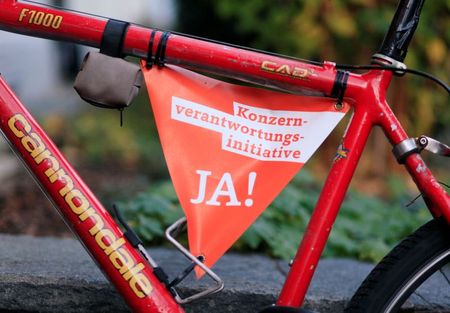Swiss firms narrowly avoid ‘Responsible Business’ liability as vote divides nation
By Brenna Hughes Neghaiwi
ZURICH (Reuters) – Swiss firms narrowly avoided facing greater liability for human rights and environmental abuses on Sunday after a national vote rejected the proposal due to regional differences despite it winning majority popular support.
In a divisive referendum, 50.7% of Swiss voters supported proposals by the Responsible Business Initiative (RBI) to extend liability over international human rights abuses and environmental harm caused by major Swiss companies and the firms they control abroad.
But the initiative failed to win support in a majority of cantons, a necessary condition for a public initiative to be enacted in Switzerland, paving the way for a milder government counter-proposal to come into force.
It is the first time in over 60 years a Swiss vote has failed on regional grounds after winning popular support.
“The Federal Council is pleased with the result, but is also aware that many who have fought for years for the initiative are disappointed today,” Justice Minister Karin Keller-Sutter said at a press conference.
She said the enactment of new government measures meant supporters would not leave the campaign with empty hands. “The Federal Council is convinced that this is a good way to achieve the common and undisputed goal of better protecting human rights and the environment.”
The government proposal will require firms to step up and publicly report checks on their overseas operations and supply chains, hitherto voluntary measures, but stops short of extending liability to Swiss courts.
Proponents of the initiative said its broad public support – a rare, if symbolic, victory for a politically and economically progressive issue in the traditionally staid country – remained cause for sharper scrutiny of multinationals and commodities firms in one of the world’s leading commercial centres.
“Human rights is such a fundamental issue. People understand you can’t justify human rights violations by economic considerations,” Florian Wettstein, a professor for business ethics at the University of St. Gallen and co-organiser of the initiative, told Reuters.
In a polarizing campaign, the government and multinationals denounced the negative economic consequences of the proposal, while activists, religious groups and various political factions argued Switzerland risked falling behind other countries in tackling progressive social and economic issues without it.
“It was the most aggressive campaign I’ve ever experienced in my 20 years in politics,” parliamentarian Christa Markwalder told Swiss broadcaster SRF.
Meanwhile, voters more clearly rejected a proposal seeking to impose a ban on funding arms makers, the latest anti-military referendum in a nation that has not fought an external war for 200 years.
The vote, which held implications for major Swiss banks and investors including the country’s central bank and pension funds, as well as Swiss industry, received 57.5% rejection.
Organisers said the more than 40% approval gained by the initiative, spanning beyond the country’s most left-leaning political camps, nonetheless put pressure on arms financing and showed the need for further action.
(Reporting by Brenna Hughes Neghaiwi; Editing by Kirsten Donovan and Jan Harvey)
